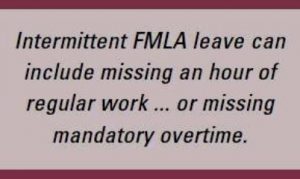By Tiffany Robertson – March 5, 2015
A federal district court recently ruled that an inability to perform essential job functions plays no role in determining whether an employee qualifies for leave under the Family Medical Leave Act (FMLA). Unlike the Americans with Disabilities Act (ADA), this means employers must provide FMLA leave, even if it would permanently remove an essential function of the employee’s job.
 The court’s ruling stems from a plaintiff who worked as a material storage supervisor for a state transportation department, a position that required significant overtime in the winter months. However, since 2000, the plaintiff suffered from cluster headaches, an often-disabling condition far more severe than migraines. In 2011, he provided a medical certification from his doctor, stating that the plaintiff’s overtime hours were the primary cause of his headaches and requested FMLA leave whenever his position required him to work overtime. Since he did not work overtime hours year round, the 12 weeks of FMLA leave allowed in a 12-month period was sufficient to cover all the overtime required in his position.
The court’s ruling stems from a plaintiff who worked as a material storage supervisor for a state transportation department, a position that required significant overtime in the winter months. However, since 2000, the plaintiff suffered from cluster headaches, an often-disabling condition far more severe than migraines. In 2011, he provided a medical certification from his doctor, stating that the plaintiff’s overtime hours were the primary cause of his headaches and requested FMLA leave whenever his position required him to work overtime. Since he did not work overtime hours year round, the 12 weeks of FMLA leave allowed in a 12-month period was sufficient to cover all the overtime required in his position.
Naturally, his employer balked at his request to remove an essential function of his job and effectively change his position to one entailing no overtime hours. Human resource officials pointed to provisions in the plaintiff’s union contract stating that if he can no longer perform an essential function of his job, the employer would attempt to find him a position with “less arduous duties.” The contract also provided that if no such position is available, he will have to apply and qualify for disability retirement or the employer could terminate his employment. After determining no other position was available, the employer denied the FMLA leave request and advised the plaintiff that — unless he qualified for disability retirement — it would terminate his employment if he did not work the mandatory overtime hours.
In court, the employer argued that the FMLA does not entitle employees to alter their job functions permanently. The court acknowledged that the application of FMLA leave in this case would essentially allow the employee to convert his position to one without mandatory overtime. However, despite the Department of Labor being aware of this potential result — and the fact that Congress has considered restricting intermittent FMLA leave — the court found nothing in the statute prohibiting this outcome. Instead, the court stated the FMLA specifically intended for employees to use FMLA leave to address serious medical conditions preventing them from performing the essential job functions.
The court also rejected the employer’s claim that the FMLA only allows the plaintiff to take leave when the headaches occur, not when he anticipates he may get one. Again, the court found nothing prohibiting the plaintiff from taking FMLA leave to avoid his headaches. Rather, the FMLA regulations specifically provide employees may use FMLA leave to prevent illness, using as an example an employee with asthma who is unable to work — or ordered by his doctor to stay home — when the pollen count is high.
Most employees will not be able to mimic the plaintiff and use FMLA leave in just such a way that it alters their position permanently, essentially granting an accommodation that might not be available under the ADA. Nonetheless, human resource managers and directors must be aware of the need to evaluate every medical claim under both the ADA and the FMLA to determine the appropriate course of action. Thomson Reuters’ Family and Medical Leave Act (FMLA) training and Americans with Disabilities Act (ADA) Training cover the basic requirements of the law and highlight real-world compliance situations to help employees recognize and address these issues appropriately and avoid violations.
via FMLA Offers Employers No Protection against Changes in Essential Job Functions or Undue Hardship.
